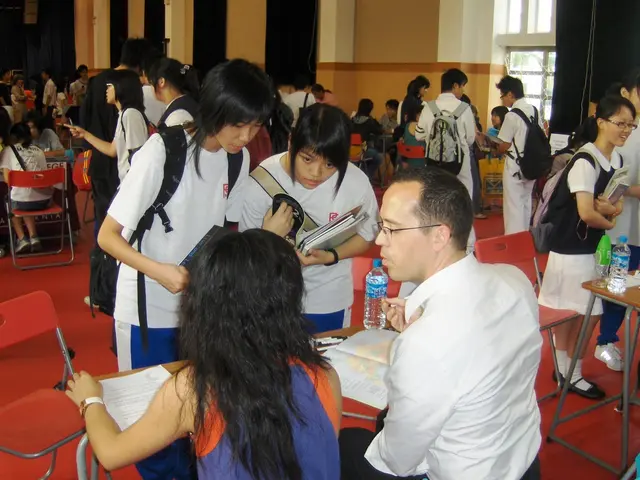Flipping the Script in Baku: A Secretive Gathering Between SPD and CDU Pols and Putin's Pals
SPD and CDU politicians convene with Putin's trusted associates
In the midst of political scandal, German representatives from the SPD and CDU find themselves in hot water following allegations of confidential meetings with Moscow's elite in Baku. Here's the lowdown on this dodgy affair, complete with a dash of insider intel.
April brought a group of heavy-hitters from the German political scene to Baku, Azerbaijan, according to ARD's "Kontraste" and the weekly newspaper "Die Zeit." The attendees included SPD MP Ralf Stegner, former CDU Federal Chancellery chief Ronald Pofalla, former Brandenburg SPD Minister-President Matthias Platzeck, former CDU Europe Minister in NRW Stephan Holthoff-Pförtner, and longtime CEO of the "Petersburg Dialog," Martin Hoffmann. Representing Russia were former Prime Minister and current Gazprom Supervisory Board Chairman Viktor Zubkov, and Chairman of the Russian Human Rights Council, Valery Fadeyev, who's on the EU sanctions list for spreading war propaganda and disinformation.
Politics: Merz, Trump and the Ukraine War - "Putin's offer is a sign of a certain panic"
These secretive meetings seem to be revolving around the revival of the "Petersburg Dialog," an influential, but controversial format between Germany and Russia. Initiated by then-Chancellor Gerhard Schröder and Kremlin chief Vladimir Putin in 2001, the dialog aimed to bolster business ties and improve relations. However, the dialog was officially suspended in 2022 following Russia's large-scale invasion of Ukraine.
Did He Pack a Spare Phone?
Stegner, who served on the parliamentary control committee for intelligence services in the last Bundestag, has become a target of criticism due to his involvement in these clandestine meetings. CDU MP Roderich Kiesewetter demands answers: "It's not acceptable that we intensively discuss the security policy of the Federal Republic of Germany while simultaneously becoming subjects of Russian discussion events. Did he travel with a second phone? How did he protect himself?"
Politics: How Does Moscow View Merz's Election? Munz: Russian Press Sees a "Lame Coalition" in Berlin
SWP Russia expert Sabine Fischer claims these covert meetings weaken Germany's hard sanctions policy against Russia. Speculation suggests the Russian goal is to establish influential channels in German politics.
In a joint statement, Stegner, Pofalla, Platzeck, and Holthoff-Pförtner defended their rendezvous with Russian representatives in Baku. "Maintaining dialogue contacts with all parts of the world, including Russia, is a fundamental principle of effective foreign policy, especially during turbulent times," they wrote in a statement shared with the "Süddeutsche Zeitung" (SZ). The statement also confirms that these conversations were confidential, but not surreptitious backdoor negotiations involving government agencies.
While the politicians assert that government representatives neither initiated, prepared, or supported the talks, reliable sources tell the SZ that then-Federal Chancellor Olaf Scholz was informed about the efforts to hold these discussions.
In summary, this Baku meeting between prominent German politicians and high-ranking Russian officials raises questions about the integrity and transparency of our diplomatic proceedings. Whether it's a bid to rekindle the "Petersburg Dialog" or something more, this powder keg of a situation continues to grow as more details emerge. Stay tuned for further updates.
- The CDU's Ronald Pofalla, SPD's Matthias Platzeck, and Stephan Holthoff-Pförtner from the CDU's NRW, alongside SPD MP Ralf Stegner, collectively defended their meetings with Russian representatives in Baku, arguing that maintaining dialogue with global parties, including Russia, is a fundamental aspect of effective foreign policy, particularly in times of turmoil.
- Brandenburg's CDU MP Roderich Kiesewetter questions Stegner's involvement in the clandestine meetings in Baku, raising concerns about the use of secondary communication devices and the protection of sensitive information.
- SWP Russia expert Sabine Fischer speculates that these covert meetings undermine Germany's firm sanctions policy against Russia, suggesting that Moscow may be seeking to establish influential networks within German politics.
- WhatsApp messages, reportedly exchanged between lobbyists close to Putin and German politicians, raise questions about whether government representatives were aware of, or even supported, the efforts to engage in these discussions, casting doubt on the official stance that government agencies played no part in these secretive meetings in Baku.








